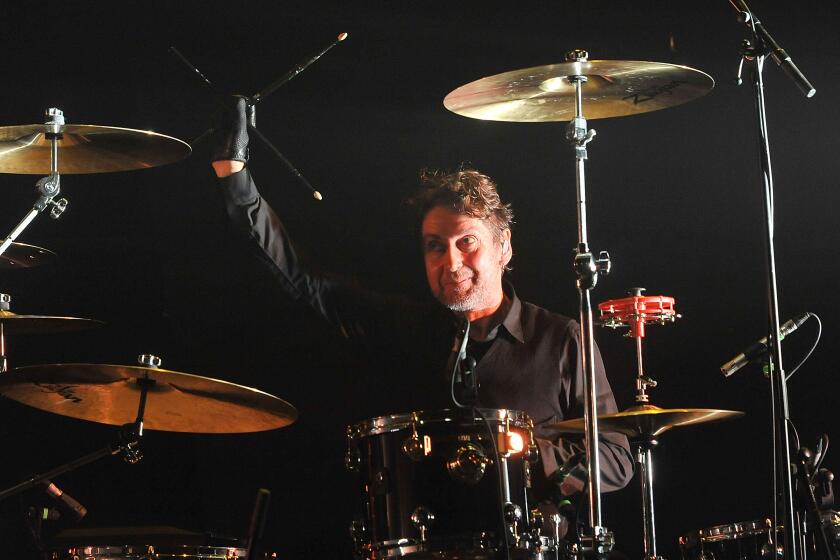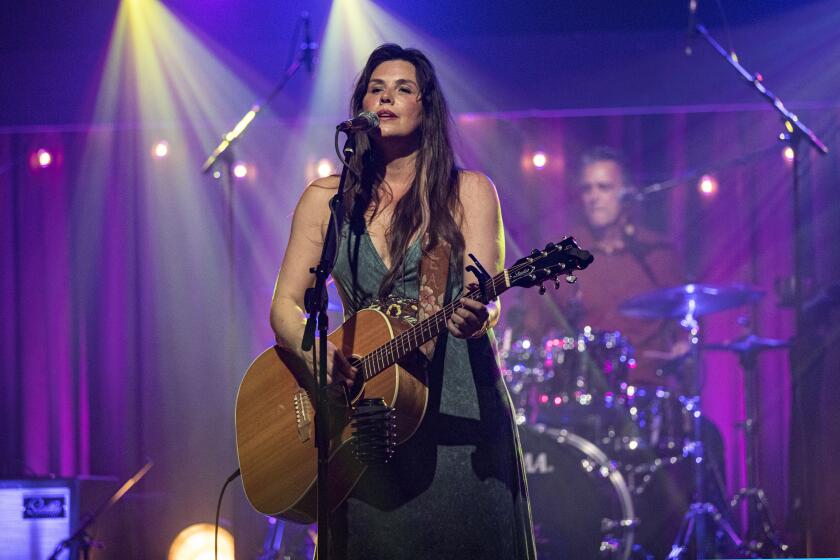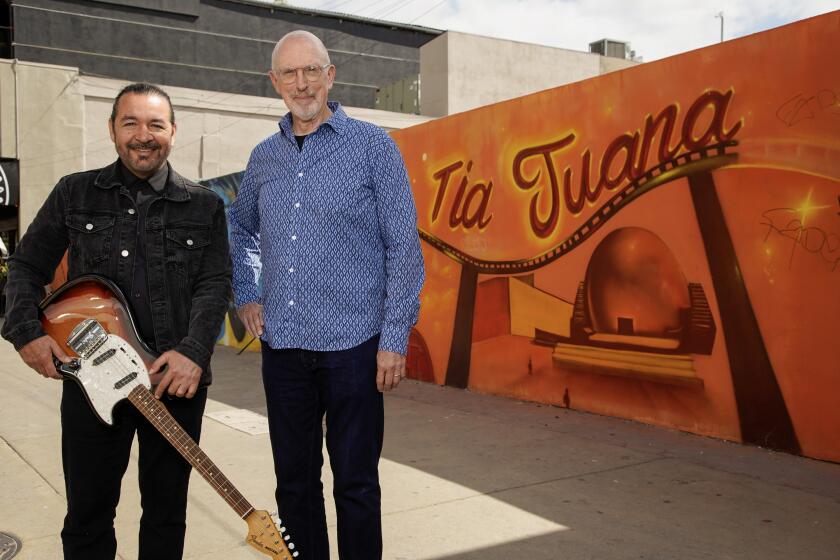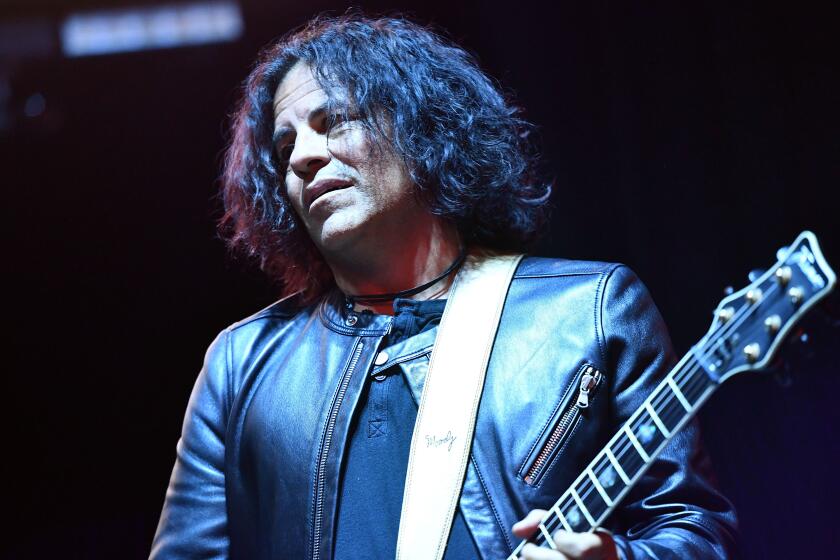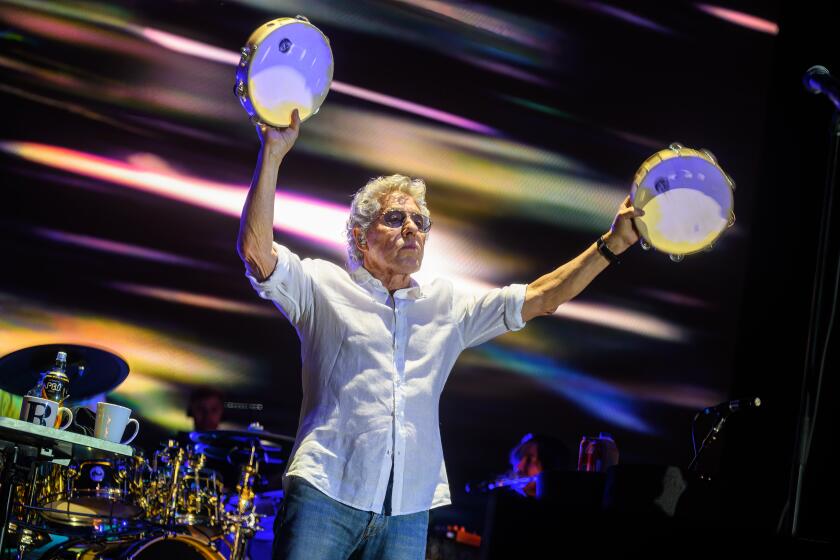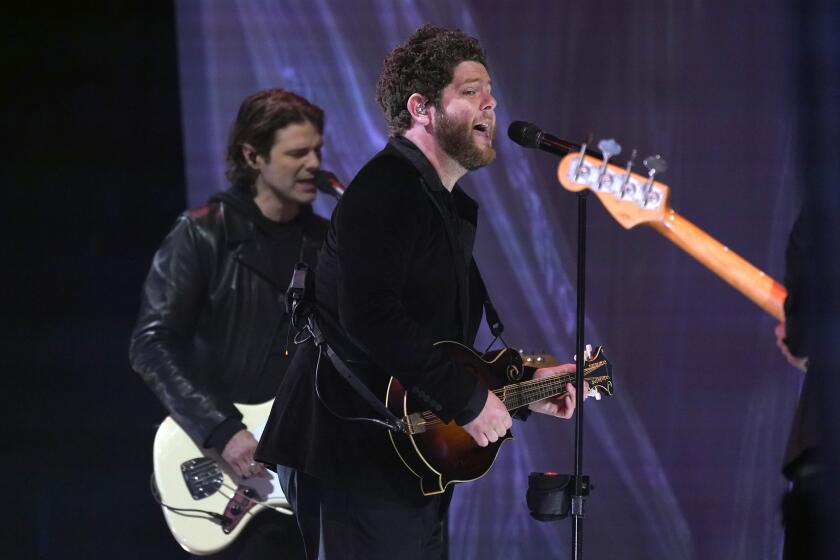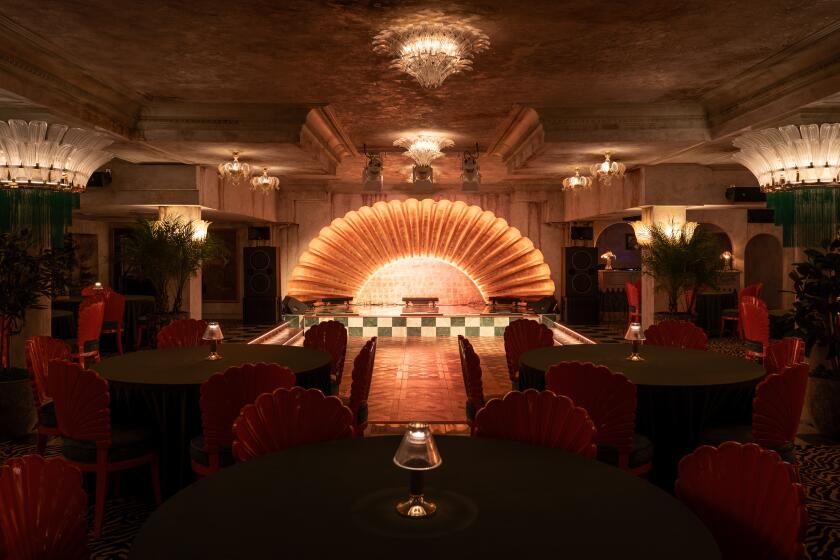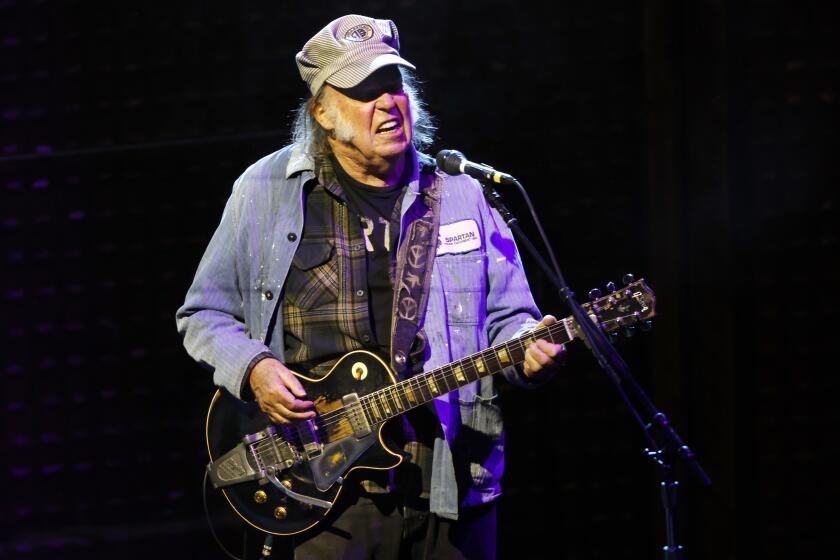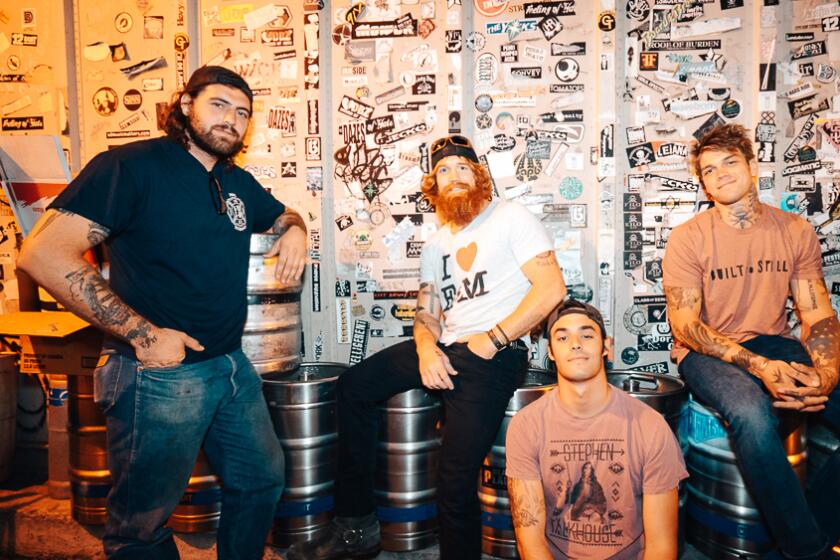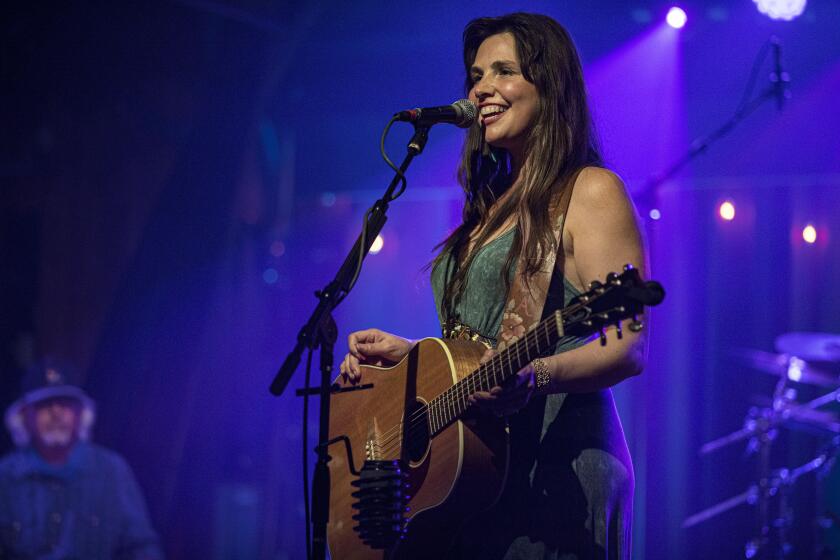Jimi Hendrix at 75: the stars weigh in on guitar icon’s legacy
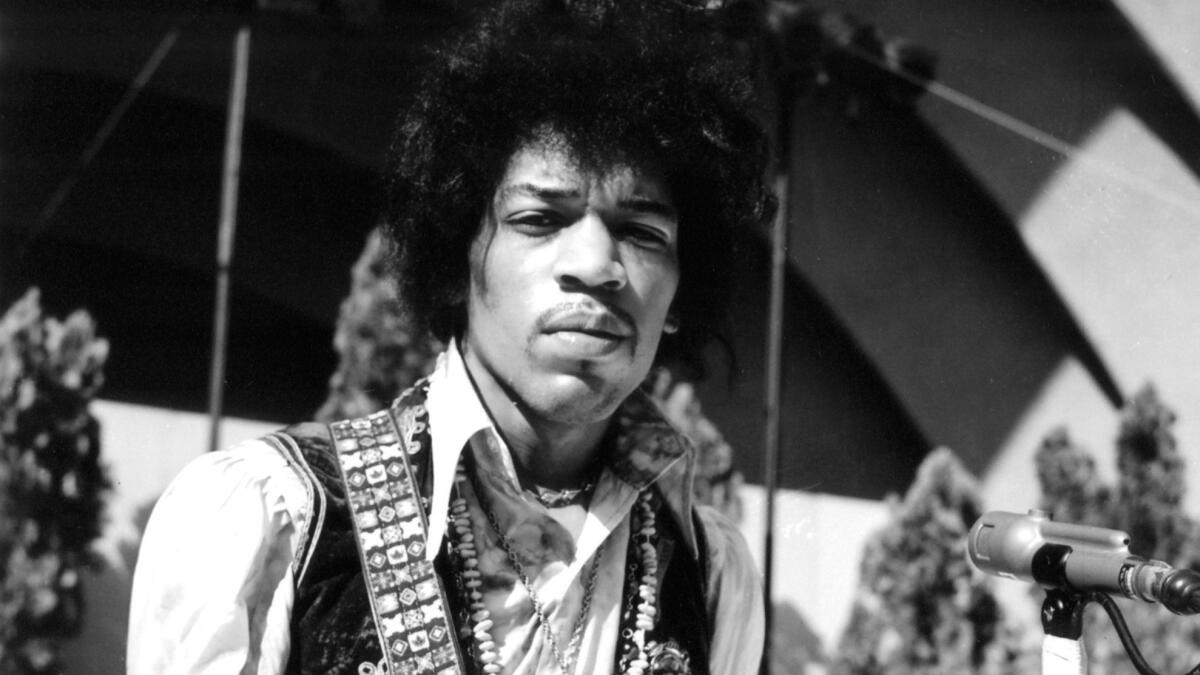
Jimi Hendrix was born 75 years ago today.
He was only 27 when he died on Sept. 18, 1970. But in that short time Hendrix irrevocably changed the electric guitar — and, with it, rock ‘n’ roll — with his visionary, often mind-bending approach to his instrument and music in general.
We saluted Hendrix’s many contributions in February, when this year’s edition of the annual “Experience Hendrix” tour passed through town. It was the latest reminder of just how strongly his music continues to resonate, both with longtime fans and young listeners who weren’t born until decades after his death,
To salute Hendrix and his enduring artistic legacy, here are quotes from recent and vintage Union-Tribune interviews with an array of past and present rock, pop, country, blues, folk and jazz artists.
Don Henley of the Eagles: “Jimi was an absolute original. You don’t hear that kind of soul today.”
Bruno Mars: “Hendrix is the greatest guitar player in the world … a guy who mastered that instrument — it was talking when he played. And when he did a solo,he made the guitar cry, or made it sound like it was coming from the devil’s amplifier.”
Waylon Jennings: “Hendrix revolutionized the guitar. He reinvented it.”
Dweezil Zappa: “Most of Jimi’s songs on his records are under three minutes, yet they feel like they are epic. Jimi had a style that was so recognizable and it was also so much a part of his natural personality He expressed himself with the guitar very freely and his performing style was always synchronized with his playing. It wasn’t an act; that’s just what he did to get the sound.”
Dave Navarro: “Jimi Hendrix was the most influential person in my life, other than my parents. When I was about 10, I was at a skate (board) park, and they were playing Hendrix over the P.A. system; I think it was `Purple Haze.’ When I heard that, I realized I wanted to do whatever he was doing.””
Jack Johnson: “I’ve held back on saying this, but Hendrix has had more influence on me than anybody. It wasn’t just his guitar playing, but his songwriting and chord progressions. Especially with ‘1983 (A Merman I Should Turn To Be),’ just being a kid and hearing this song about taking off to this underwater world, and then he shapes this underwater landscape for 13 minutes. … That entire album (‘Electric Ladyland’) has had a big influence on me and been the soundtrack of my life.”
Micky Dolenz of The Monkees: “I saw Hendrix in 1967 at the Monterey International Pop Festival and thought he’d make a great opening act for The Monkees. ... He was very shy and quiet. He was just a kid — we all were.”
Adrian Belew: “Without Jimi Hendrix I don’t even know if I’d be here playing guitar. He exploded my idea of what guitar playing is. He’s responsible for fielding quite a few generations of guitar players. I also loved his voice. Not many people say much about his voice, but I thought he had the coolest sound in his singing. I must admit that the first time I heard `Purple Haze’ I thought, `This guy must have dropped in from another planet!’ ”
Tracy Chapman: “It’s a given that Hendrix was a very talented guitarist. He was doing his own thing instead of what was expected of black musicians at the time. Having listened to his records for a long time, I have a great appreciation for his technique and innovation.”
Fairport Convention co-founder Richard Thompson: “Hendrix could play anything, left-handed, right-handed, it didn’t make much difference. And he was a very sweet guy... We used to play at 2 a.m. in the Speakeasy in London, and Hendrix would be happily drinking. Then he’d come up and say, `Mind if I sit in with you chaps?’ And we’d say, `Gosh, it’s Jimi Hendrix. Of course, you can sit in.’ We weren’t going to say no! He was extremely gracious and a great guy. Was it intimidating? Absolutely. This extremely handsome, suave, black geezer jumps on stage, and we were a bunch of pale, pseudo-intellectual British suburbanites, just out of school.”
George Benson: “It’s amazing the power of Jimi Hendrix’s legacy. When I heard him do the national anthem, I thought, `Wow, what a genius!’ And then I knew why people had worshiped his guitar playing. He was an inventive guitar player and, unlike a few of the other greats, he was not afraid to try something. Although his playing was blues-based and inspired by people like B.B. King, he truly played from the heart. He was unique.”
B.B. King: “I know that Stevie Ray Vaughan, without a doubt, listened to him and you can tell that most of the modern guitarists do also. You can hear him through them. I got a lot of ideas listening to him.”
Stevie Ray Vaughan: “I wish Hendrix hadn’t died the way he did. Part of what happened to him, well, a lot, was (because of his) not paying attention to what drugs will do to a person, any person... I have the utmost respect for him, his music, what was behind his music, what he was trying to say and seemed to be saying with his music.”
Anna Popvić: “I was maybe 4 or 5 years old when my father played me a Hendrix record in Belgrade When I started playing guitar at 12, I began watching Hendrix’s concert videos and he had this incredible energy on stage. That was before I got into his lyrics and the deeper messages in his songs. He transmitted an incredible energy through his guitar and became one with it… There is so much depth in his music — and his guitar playing was one of a kind. He was absolutely the first to do that. And, still to this day, nobody does that it that way.”
Jazz trombonist Ray Anderson: “Hendrix made the link for me between John Coltrane and James Brown and the blues; he had the energy of my generation. And Janis introduced a lot of people to the blues who had not heard it before.
Etta James: “Jimi and one of my background singers, Faye, used to live with me in New York in the early ‘60s, when he was working as a roadie for the Isley Brothers. She was his old lady, and they would both sleep in the bathtub in my one-room apartment. We named him `Egg Foo Young’ because he loved to eat egg foo young so much! Believe me, at that time Jimi couldn’t play; all he could do was turn the guitar up real loud. As a matter of fact, he was playing that two-stringed blues stuff. We knew he had the potential, but music hadn’t gotten to that psychedelic, tie-dyed point yet. He just took the blues and intensified it. People think he was a master, but he was just `Egg Foo Young’ to us.”
george.varga@sduniontribune.com
Twitter @georgevarga
Get U-T Arts & Culture on Thursdays
A San Diego insider’s look at what talented artists are bringing to the stage, screen, galleries and more.
You may occasionally receive promotional content from the San Diego Union-Tribune.

